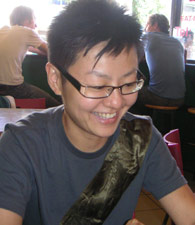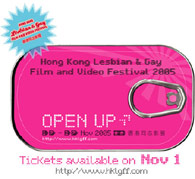Established in 1989, the Hong Kong Lesbian and Gay Film Festival is the largest and longest running LGBT film festival in Asia. The non-profit festival will present 60 screenings with a highlight on Latin cinema, a retrospective on the infamous Bruce La Bruce and cutting edge lesbian films/videos from the Asia region.

Denise: 33, Female, PhD candidate & Hong Kong Lesbian & Gay Film and Video Festival (HKLGFF) Director, Hong Kong
æ: What are you currently occupied with?
Denise: I'm obsessed with the HKLGFF at the moment. It takes every waking moment of mine.
æ: How did you get involved with HKGLFF?
Denise: I got involved in 2003 when I delivered a seminar comparing two films Desiree Lim's Sugar Sweet and Yau Ching's Ho Yuk: Let's Love Hong Kong. In the following year, Raymond Yeung who was the Festival Director from 2000-2003 invited me to a meeting and basically talked me into being involved with HKLGFF. It has been quite a learning experience since then.
æ: What are the highlights of the festival?
Denise: Two of my favourite series for this year is the Asian Lesbians' Kung Fu 101 and Hola! Latin Queer Cinema. There are 21 cutting edge short films/videos from neighbouring Asian countries in the Asian Lesbians' Kung Fu 101 series. We have invited Yau Ching to be our guest curator for this series. To have them in a collection is a tremendous feat! Of course, the 2005 Asian Lesbian Film Festival held in Taipei earlier in August was the first film festival to highlight lesbian works. We learnt from them and solicited more Hong Kong short videos to put together a local shorts program. For Hola! Latin Queer Cinema, the films were simply moving beyond words from the Teddy Award winner Anahi Berneri's A Year Without Love to O Fantasma director Joćo Pedro Rodrigues' Odete.
æ: What do you do at The Hong Kong Polytechnic University?
Denise: I'm currently a PhD candidate at the Hong Kong Polytechnic University. I am writing my doctoral thesis on lesbian-identified women living in an urban culture such as Hong Kong.
æ: At the 1st International Conference of Asian Queer Denise: Studies in Bangkok in April this year, you presented a paper titled "If Only I Could Be the k.d. lang of Asia: Lesbians and Karaoke Culture in Hong Kong." What got you interested in this topic? Are you a karaoke fan or do you go to karaoke bars
frequently?
Denise: HA! I actually changed my paper to an investigation of spaces used and identified by lesbian-identified women. I conducted interviews and asked them their usual hangouts and what accounts as comfortable or safe spaces for them, and of course, karaoke bars are one of the identified locations. I am not a karaoke fan and I guess if I decided to a paper only on karaoke bars, I will need to have my hearing tested afterwards and not to mention the high electricity bill I would end up with since I need to wash my clothes to get rid of the stinky smoke smell from every piece of garment on my body.
æ: What role(s) do you think karaoke bars play in terms of socialisation and networking of lesbians in Hong Kong?
Denise: I do think that karaoke bars play a role in socialisation and networking of lesbians in Hong Kong. One interview subject told me that what else could one do in Hong Kong and feel safe about being in a room with your girlfriend if it is not for karaoke bars. This is especially true for women who are still living with their families.

Denise: The Japanese fairy Yura Yura Unazukin and many kind friends around me.
æ: What's you favourite lesbian film of all time and why?
Denise: Yau Ching's Ho Yuk: Let's Love Hong Kong. A slightly sad film but has immense strength within. It truly expresses the feeling that I often had of an environment being stifling and silencing, yet at the same time, one can find immense strength within to survive. Beautiful cinematography.
æ: What is the achievement you are most proud of?
Denise: Probably the two years I worked at an inner-city women's crisis centre in the Downtown Eastside in Vancouver B.C., Canada. I learnt a lot about the fine line between life and death, and how this fine line is often not affordable for many, and one lives crossing this line back and forth without much hope on a daily basis.
æ: How are you misunderstood?
Denise: Often being inarticulate about matters that are dearest to me.
æ: How do you spend your Sundays?
Denise: What are Sundays?!
æ: Tell us one of your fantasies?
Denise: Winning a lottery and setting up a foundation for lesbian artists/ scholars/ community projects.
æ: What was the most important thing that happened to you in the last 12 months?
Denise: Meeting someone. That's all I'd say! :)
æ: What do you think is important in a relationship?
Denise: Honesty, trust and passion. The usual stuff.
æ: What (or who) turns you on?
Denise: Johnny Depp in drag in Julian Schnabel's Before Night Falls.
æ: What's your biggest guilty pleasure?
Denise: Eating ramen noodles or any kind of fast food.
æ: What is your vision for the gay community?
Denise: To be different but to unify when needed.
æ: Tell us about a cause that you support?
Denise: Women who have survived sexual violence and physical abuse.
æ: Who would your dream date be if you were straight for a day?
Denise: Asano Tadanobu, Zhang Chen, Johnny Depp or Takashi Kaneshiro.
æ: Tell us something even your mother doesn't know.
Denise: I have attended a sex party!
